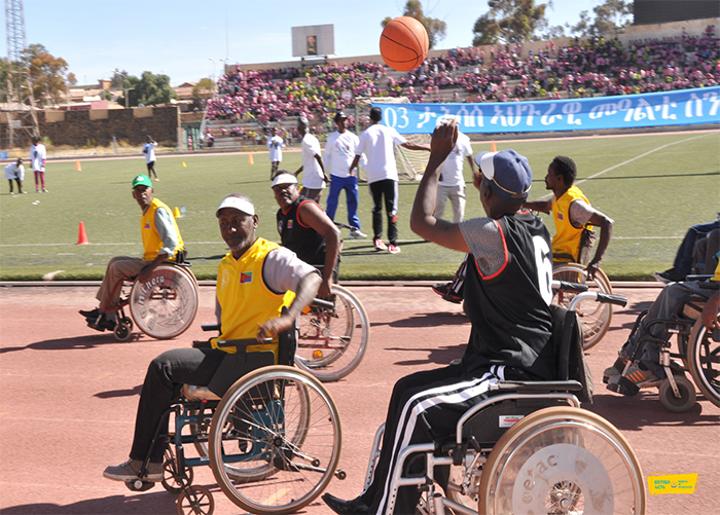Africa-Press – Eritrea. International Day of Persons with Disabilities (PWDs) was commemorated yesterday, 3rd December, under the theme “Strengthen Concerted Resistance for the Participation of PWD’s.” The day was first announced by the UN in 1992 to advance disability rights and protect the wellbeing of people with disabilities.
According to the World Health Organization (WHO), around 15% of the world’s population is considered to have some form of disability. But all too often, the needs of people with disabilities are not catered for by the society they live in.
The core principle of the Universal Declaration of Human Rights is that “all human beings are born free and equal in dignity and rights”. In Eritrea, this has guided the Government’s programs to ensure equal rights for the disabled and include them in all sectors of the economy without any barrier.
Although religious and philanthropic organizations cater to the needs of orphans, the destitute, and the disabled, it is often the traditional Eritrean family that takes care of its members such as the elderly and the disabled that need support. And most of the time, the cost of treatment and care of PWDs are covered by their own families.
Most of the time, the social, emotional and financial needs of the disabled members are met by the family not only because of the “stigma” attached to disability but also because the family’s pride relies on its ability to manage its own challenges using its own means and capacity even if it is too much to bear. This approach to the challenge has caused disability to be viewed as an “individual” rather than a “social issue,” resulting in the indifference of the society to disability.
To deal with the social problems associated with disability, the Government has established a Community Based Rehabilitation Program (CBRP) to assist the disabled to be self-reliant and to reintegrate them in the workforce. The program is implemented by opening channels to reach communities directly at grass-root levels, particularly through the training of local facilitators and village rehabilitation committees, and has been made sustainable by the active participation of the communities. The government provides legal provisions to the citizens to establish associations.
The Government’s strategy is applied to start from the lowest levels of administrative areas in a way that promotes equal participation and distribution of resources and opportunities, ensures the effective cooperation of partners, and the participation of all related institutions. The Ministry of Labor and Human Welfare (MLHW) is working to uplift the living standard of PWDs in an inclusive way.
The MLHW has adopted policy guidelines on issues concerning labor, social security, and social welfare in line with the macro-economic policy of the country. Under the social welfare-oriented policy, the rights of children, senior citizens, and PWDs are protected and ensured by creating a conducive environment. Community-based rehabilitation programs for persons with disabilities, the elderly, and disadvantaged members of the society have been accorded top priority by means of establishing rehabilitation projects, strengthening service delivery, providing technical aid to disabled persons’ organizations, and protecting the rights of persons with disabilities.
The MLHW also has to undertake these functions to do justice to the PWDs. The rehabilitation of people with disabilities may effectively be taken up by opening workshops and educational and research institutions like the Institute for the visually impaired and the Institute for the hearing impaired and providing basic education to individuals with disabilities; opening special schools and awarding scholarships for students with disability; providing employment through job reservations governmental organizations and encouraging private organizations to employ the disabled; giving the disabled travel concessions, and installing awards for disabled workers and institutions working for the welfare of the disabled.
Education in early childhood is the best means of avoiding dependence and leading a normal life for persons with disabilities. Every Eritrean is entitled to free education, and PWDs have the right to apply for and get an education at any public or private educational establishment. Usually, schools provide them free stationery and transportation.
Unemployment is one of the biggest challenges that persons with disabilities face. This has been countered by proclamations that call for the employment of persons with disabilities after finishing vocational training, promote inspection of their working conditions, and ensure that they do not face discrimination either in the types of jobs undertaken or their salaries. The laws specify all the measures to be taken in the occurrence of discrimination.
In today’s competitive world where only performance counts, presenting a disabled person as capable of doing only menial jobs is unjust. Eritrea has been working hard to change this notion through its Community-Based Rehabilitation Program, and associations such as the Eritrean National Association of the Blind, the Eritrean War Disabled Association, and the Hearing Impaired Association have been established to empower the disabled so that they may play their share in helping build the nation.
The development of a nation can only be realized by skilled and educated human resources and by helping the PWDs to become self-reliant we are helping the family, the community, and the country as a whole.
The International Day of PWDs has been commemorated for the 26th time in Eritrea and for the 30th time worldwide.
For More News And Analysis About Eritrea Follow Africa-Press







